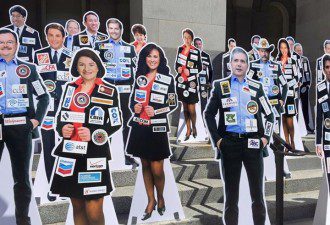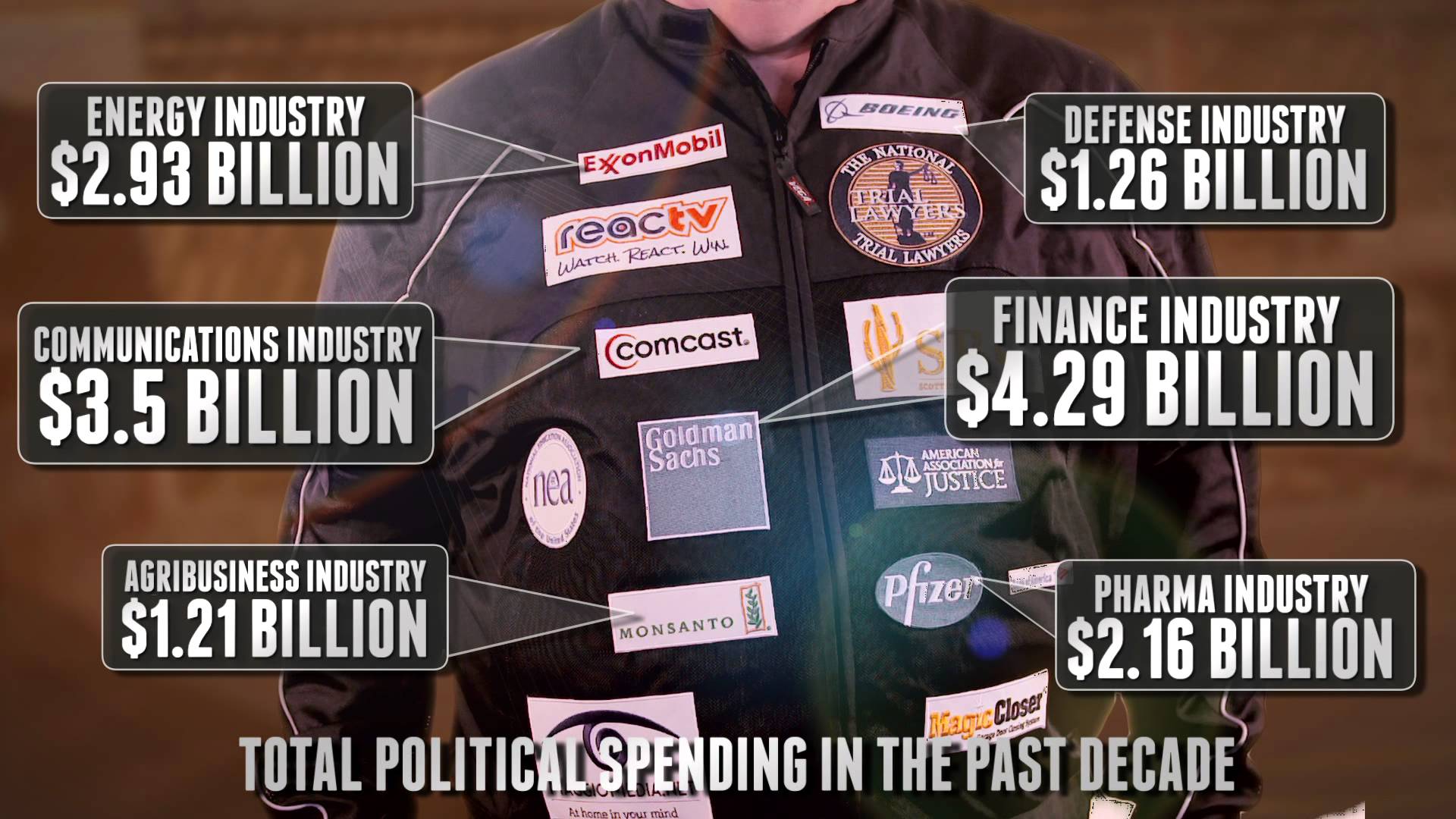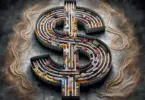Contributing Writer for Wake Up World
What once began as a joke could soon become a reality for California politicians. Popular on social media sites, memes calling for politicians to wear badges of their corporate donors have spread like wildfire for years. But no one took the idea seriously — until now.
Corruption in politics is a hot topic since the 2010 Citizens United ruling by the U.S. Supreme Court. The decision has created a free-for-all where corporate and private donations have flooded political campaigns, giving rise to power being diverted from the people into the hands of corporations and a wealthy few. Transparency has also been muddled by the ruling since corporations can now legally shield their donations from being disclosed to the public.
“Of the $1 billion spent in federal elections by super PACs since 2010, nearly 60 percent of the money came from just 195 individuals and their spouses,” reports Brennan Center for Justice, a nonpartisan law and policy institute. (source)
[pro_ad_display_adzone id=”110028″]
To San Diego entrepreneur John Cox, this is unacceptable. In response, he started the California is Not For Sale campaign, a ballot measure he hopes to put before voters in 2016, which would require state lawmakers to wear the logos of their top 10 corporate donors every time they appear in the legislature.
Inspiration From an Unlikely Quarter: Nascar Drivers
When we consider corruption in politics, the last thing that would come to mind is a Nascar driver. But with the California is Not for Sale ballot measure, politicians would suddenly have plenty in common with race car drivers sporting sponsor logos on their jumpsuits. If the measure passes, California lawmakers would display very visible donor logos on their suits, immediately illuminating any conflicts of interest for all to see. Moreover, the California Fair Political Practices Commission will have the final say as to which donor logos need to be displayed. As an added bonus, these same logos would also be required to appear in campaign ads.
While the measure may seem a bit outrageous, Cox argues it isn’t any more outlandish than the system it’s confronting. “This is a very serious initiative,” he said. “This is not a joke. If you came down from Mars and you looked at our electoral system, you’d say to yourself, ‘How dumb is this?’ You’ve got a system under which people who want something from government fund the campaigns of the people who make the decisions. How stupid is that system?” (source)
While it’s perfectly legal for lawmakers to accept money loosened by the Citizens United ruling, Cox wants Californians to have a clear understanding of who’s been bought by whom.
“Imagine this: a California Senator is speaking on the floor and proposes a bill he just drafted that will give oil companies huge tax advantages. Now imagine if on his jacket, he was wearing Chevron, Shell, and BP logos – some of his top ten contributors. Our law will bring this under-the-table-corruption to the surface and expose these politicians who take political contributions in exchange for favors for what they really are: corrupt.” (source)
Cox himself is an investment manager and self-proclaimed “Jack Kemp Republican” with an emphasis on legislation that promotes entrepreneurship, opportunity and competititon. He hasn’t held public office, but has been involved with politics in the past. After repeated disappointment in the political arena, he decided there must be a better way to inspire change. Subsequently, the California is Not for Sale campaign was born. It will need to garner 365,000 valid signatures before the idea can secure a place on the ballot, but with enough money and support, it’s doable.
The campaign began collecting signatures in January of this year using volunteers and paid circulators. Already the campaign has “… received a tremendous amount of support from the community so far. People love this idea. Their entire lives they have felt helpless and abused by politicians; our measure puts the power back in their hands,” said Ryan Smith, a coordinator for California is Not for Sale.
Press events were also held displaying life-size cardboard cutouts of all 120 state lawmakers (plus one for California Governor Jerry Brown), each papered with logos of corporations, interest groups and unions. One ingenious protest with the cutouts was placed on the steps of the California State Capitol in Sacramento. Read more about the demonstration in “The Most Hilarious Political Protest I’ve Ever Seen.”
And the response?
Some legislators made passes of the display and would invariably find their own face among a sea of logo covered figures, then smoothly turn away toward lunch. But others stormed out of the Capitol building with “looks of glee on their faces.” They would erupt with laughter and exclaim to their staffers how comical it all was.
“It’s funny and it’s inventive, but it really is a serious proposal,” said Cox, with Vice.com adding: “However, it’s expressly a way to ridicule America’s broken campaign finance system, and is not meant to be a quick, at-a-glance method for telling what a politician’s interests are.”
Additional Reforms
The California is Not for Sale campaign is the first of a two-part plan intending to reform state government. Come November 2018, Cox aims to introduce a Neighborhood Legislature initiative which would give rise to mini-electorial districts for neighborhoods. The hope is that by creating mini-caucuses, government would be brought closer to the voters. In short, local governments would have greater decision making power.
As far as the California is Not for Sale campaign is concerned, Cox would like to see it pass and then spread nationwide. He adds, “Can you imagine members of the U.S. Congress wearing these stickers?”
Article sources:
- http://www.californiaisnotforsale.com
- http://www.washingtontimes.com/news/2015/nov/26/john-cox-california-entrepreneur-proposes-donor-lo/?page=all
- http://theantimedia.org/california-politicians-could-soon-be-forced-to-wear-logos-of-top-corporate-donors/
- http://www.vice.com/read/putting-sponsor-patches-on-legislators-is-bananas-but-california-might-actually-do-it-293
- https://magazine.good.is/articles/californians-want-to-know-who-owns-its-politicians
- http://www.huffingtonpost.com/jessica-riley-/the-most-hilarious-politi_b_8084136.html
- http://www.news.com.au/world/activists-want-politicians-in-california-to-wear-their-corporate-sponsors-on-their-clothes/news-story/abf355bde1804c310becfeedc33e1210
- http://www.occupydemocrats.com/california-moves-to-force-lawmakers-to-wear-the-logos-of-their-corporate-donors-2/
Previous articles by Carolanne Wright:
- Monsanto Charged with Crimes Against Nature and Humanity – Set to Stand Trial in 2016
- Considering the Flu Shot? Here are Five Reasons to Think Twice
- Dr Sebi: The Man Who Cures Aids, Cancer, Diabetes and More
- Plastic-Eating Mushroom Discovered in the Amazon Rainforest — A Solution for Our Trash Saturated World?
- Chronic Lyme Disease: A Modern Plague the Government Chooses to Ignore
- Big Pharma and Organized Crime — They are More Similar Than You May Think
- Over 100 Scientific Studies Agree: Cannabis Annihilates Cancer
- Emotional Energetic Healing: The Future of Medicine is Here
- Why Every Parent Should Consider Unschooling
- The Greenhouse of the Future: Grow Your Own Food Year-Round With This Revolutionary System
- First U.S. City Produces More Electricity Than It Uses — With 100% Renewable Technology
- Autistic Boy with Higher IQ Than Einstein Discovers Gift After Removal from State-Run Therapy
[pro_ad_display_adzone id=”110025″]
[pro_ad_display_adzone id=”110027″]








